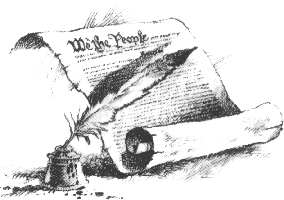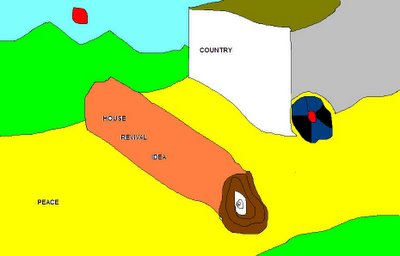

Kamal Thapa: “The agreement between the Maoists and the political parties will rather complicate the peace process while the issue of disarming the Maoists and the army under the supervision of the United Nations at the time of constituent assembly is a laughing matter.”
“The leaders who have been head of the government have failed to realise the difference between the Maoist’s army and the Royal Nepalese Army and this only reflects the level of their ideological bankruptcy.”
“This unnatural coalition between the seven parties and the Maoists will spur more anarchy, conflict and bloodshed.”
Satchit Shamsher Rana: “The political parties have formed an unnatural coalition with the Maoists under the guidance of the foreigners.”
And you thought the Rana rule was over, Jung Bahadur is no longer on the scene.
Democracy is every Nepali's birthright. And those who conspire against democracy ought to be tried for treason. Satchit Shamsher conspired against the people in 1990, and he is doing so now These are crimes he is committing. You document their misdeeds, and you subject them to due process.
A military crackdown does not have to happen. Those who merely speak it, those who merely issue threats are guilty of treason and should be tried by the democratic government once it takes over power.
These people are beyond redemption.
NATIONAL 6 -(Spotlight Weekly)] May 2001 Though the mobilization of army to contain internal insurgency has been finalized, its implications are still subject to debate and discussion. "When police fails to control an insurgency, then the army is mobilized to suppress the rebellion. But in such a case the hands of the army should not tied and a state of emergency needs to be declared in the region," said Satchit Shumsher JB Rana, former chief of army staff at the Royal Nepalese Army. "It would be much easier for the army to accomplish its job if the parliament and police support its actions." .... According to Rana, in Nepal, the army is much more powerful than the (Maoist) rebels. So, if there is any assault against it, it will retaliate. In such a case, the number of casualties could be much higher. In such a case, if the armed conflict gets on protracted as professed by the rebels, the country could fall into the trap of a civil war, warn experts.
Local News [The Kathmandu Post (Nepal)] September 2003 Leader of the CPN (unity centre) Chitra Bahadur KC, former judge Krishna Jung Rayamajhi, former Chief of the Army Staff, Satchit Shumsher JB Rana, Man Mohan Bhattarai of the Nepali Congress (Democratic), CPN-ML general secretary CP Mainali and other speakers called upon the Maoists to stop the serial murders and seek a solution through dialogue.
The Rising Nepal 2005
Nepali Times | Issue 135 | From the Nepali Press 2003 There must be give and take for the ceasefire to become lasting peace. His Majesty’s Government and the Maoists can’t lead the talks to a logical conclusion by themselves. Political parties, social and human rights organisations should all be taken on board. It is very sad to see major political parties talking contradictorily regarding the peace talks....... The strength of Bangladesh’s army is nearly 125,000 while its area is roughly equal to ours. Sri Lanka now has an army of 150,000. The number of soldiers in Nepal is only around 50,000. Given our geographical conditions, Nepal needs to raise the strength of its army to around 125,000. In that situation, problems like the Maoist insurgency can be prevented from happening again. A nation’s security is as essential as education, health and development. ...... It’s our good fortune the army was not politicised and has His Majesty as the supreme commander. Otherwise, its fate would have been similar to that of the bureaucracy, police and intelligence sectors. If the army had been politicised, the Maoists would be ruling the country today. ..... The king has kept the army in order. If it is controlled by the parliament, the army can’t serve the nation properly. There should be a unitary command and the army must remain under the head of the state.
Nepali Times | Issue 134 | Nation | Peace now, talks later 2003 “The Maoists seem quite serious about a peaceful resolution this time, while the government looks utterly confused,” concludes Bhogendra Sharma, who was one of the rights activists who met the Mahara-Sharma duo on Tuesday. Sources say a high-level team comprising former chief secretary Karna Dhoj Adhikari, former chiefs of the Royal Nepali Army Satchit Shumsher J B Rana and Dharmapal Barsingh Thapa, and former police chief and RPP leader Dhruba Bahadur Pradhan, have been put into place to devise the government’s peace strategy.
MS Nepal - Maoist Insurgency Said Satchit Shumsher JB Rana, former chief of the Royal Nepalese Army, "Unlike a regular army, terrorists do not fight from a single fixed position. If they continue to keep their supply lines open, the war could stretch."
In The News
This is unholy tie: Analysts Gorkhapatra, Nepal
Parties-Maoist agreement unnatural: Satchit
‘Dialogue initiative with Maoists legitimate’ Kathmandu Post, Nepal
Parties-Maoist agreement unnatural: Satchit NepalNews
King mulling yet another autocratic move: Nepal NepalNews
Govt will first study parties-Maoist agreement: Vice-chairman Bista
Annan welcomes Alliance-Maoist accord
Government attempting to foil mass meeting: UML
Efforts for restoration of peace positive: FM Pandey










